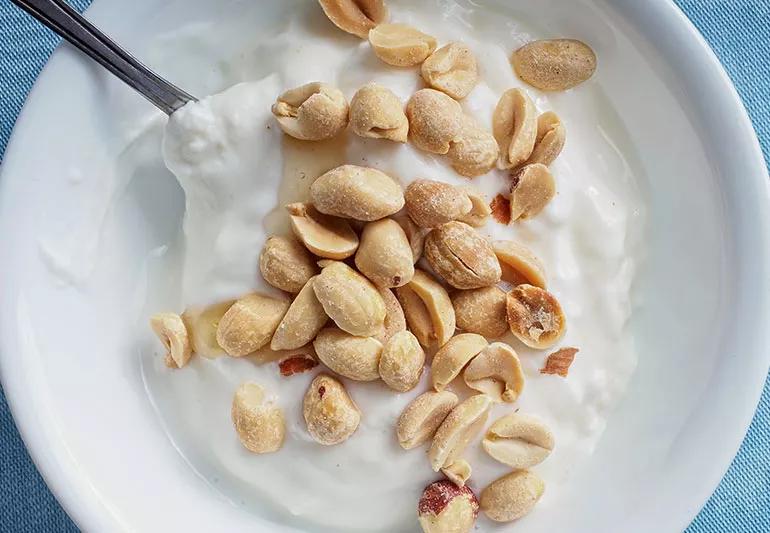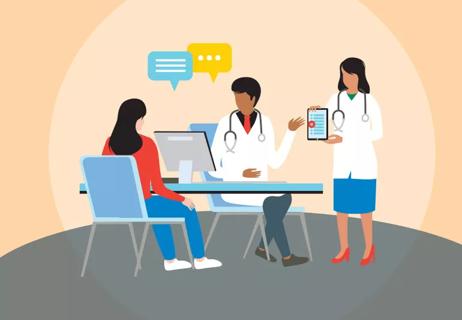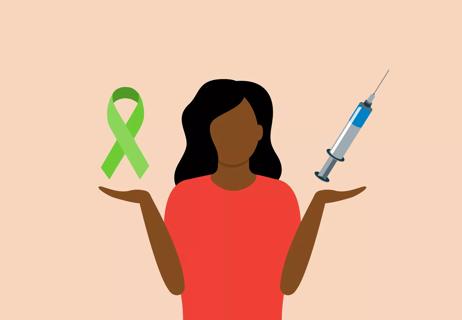Certain foods like whole grains, eggs and nuts can boost your well-being during treatment

A healthy diet can help you feel your best — and may be an integral part of cancer prevention and treatment. This includes lymphoma, a cancer that forms in your lymphatic system and affects lymphocytes, which are cells in your immune system. There are two groups of lymphoma:
Advertisement
Cleveland Clinic is a non-profit academic medical center. Advertising on our site helps support our mission. We do not endorse non-Cleveland Clinic products or services. Policy
Each year, about 20 people in 100,000 are diagnosed with non-Hodgkin’s lymphoma, while about 3 adults in 100,000 are diagnosed with adult Hodgkin’s lymphoma.
When you’re going through treatment for lymphoma — or even if you’re looking to reduce your risk of getting it — eating the right foods is key.
Registered dietitian Amanda Bode, RDN, LD, explains how a healthy diet can enhance lymphoma treatment.
Diet alone can’t treat lymphoma, but it’s still essential. What you eat during treatment can greatly impact how you feel.
Lymphoma treatment involves a combination of chemotherapy medications, monoclonal antibodies, steroids and sometimes radiation therapy. These treatments can cause side effects like decreased appetite, nausea, changes in taste and mouth sores. This is where the right diet comes in.
“Lymphoma treatment can decrease your energy levels and make it difficult to eat. Malnutrition is a common concern for people who have a decrease in intake, which leads to muscle weakness and can shorten life expectancy,” says Bode. “The right combination of foods can help you maintain a healthy weight, keep your energy up and avoid losing muscle mass.”
Advertisement
An ideal lymphoma diet is different for each person because it depends on your preferences and the side effects you’re experiencing. If you’re trying to avoid weight loss during treatment, focus on nutritious, calorie-dense foods like:
And while fruits and vegetables aren’t high in calories, they do provide important nutritional benefits.
“Eat plenty of fresh fruits and vegetables you enjoy,” advises Bode. “They offer vitamins, minerals and fiber that can help keep your energy levels up. If your mouth is sore, make a smoothie or eat soft, cooked fruits and veggies.”
You don’t have to completely overhaul your diet during lymphoma treatment. Work with a nutritionist to plan a healthy diet that includes foods you enjoy.
“You can eat healthy with your preferences and tastes in mind,” reassures Bode. “For example, you don’t have to eat almonds if you dislike them. But lymphoma treatment can change how foods taste, so don’t be afraid to try new foods. You might find that a food you disliked before tastes good now.”
When and how you eat can also help you feel your best during treatment. If nausea is severe, eat bland, dry foods like crackers, and don’t let your stomach get too empty.
“Try to eat small, frequent snacks throughout the day, even if you don’t feel hungry,” says Bode. “Your appetite may not tell you to eat, so set an alarm for snacks if you need to.”
Stay well hydrated, too — but don’t chug.
“Small sips of water or non-sugary drinks can help you avoid digestive upset and bloating,” she says. “But drinking too much at once can make nausea worse.”
You should avoid some foods if you have lymphoma or want to prevent it.
“Studies have found a link between a diet high in certain foods and a higher risk of lymphoma,” notes Bode. “Try to limit or avoid these foods and reach for more nutritious options that suit your taste.”
Foods to skip or cut back on include:
You also want to reconsider what you’re drinking as well. Avoid or cut back on alcohol, caffeinated drinks and diet soda.
Nutritional supplements like multivitamins or herbs may seem like an easy way to boost your health. But there’s no evidence that they help treat or prevent lymphoma.
Advertisement
“In general, vitamins and herbal supplements aren’t necessary if you eat a variety of nutritious foods,” states Bode. “Plus, supplements can cause side effects and might interfere with your treatment.”
Vitamin D is an exception to this rule.
“If you have low vitamin D levels, we recommend a vitamin D supplement,” she continues. “Sufficient vitamin D levels are crucial for proper immune system function and can help you feel better during treatment. Vitamin D may also help prevent non-Hodgkin lymphomas but ask your provider if you should take a supplement.”
Research has shown that eating the right foods can help prevent non-Hodgkin lymphomas. Bode recommends a plant-based diet.
“A plant-based Mediterranean diet has anti-inflammatory effects that can help you avoid all types of non-Hodgkin lymphomas,” says Bode. “A plant-based diet may also help prevent other cancers and conditions like heart disease.”
A plant-based Mediterranean diet includes:
Advertisement
The ketogenic diet is a restrictive plan that focuses on low-carb, high-fat and protein foods. And though this diet may benefit people who have a certain type of brain tumor, it isn’t helpful for any type of lymphoma.
“The keto diet is usually high in animal fats, which is the opposite of what we recommend for preventing DLBCL,” says Bode. “This diet could also cause unwanted weight loss, kidney problems or other health issues for people going through DLBCL treatment.”
The alkaline diet is all about eating certain foods that are thought to change your body’s acid or pH levels which then can improve your health. But your body regulates its pH well on its own. And though the alkaline diet focuses on eating whole foods, it does limit protein and other nutrients that are vital.
And you may have heard of the Budwig diet, which is often touted as a diet that slows the spread of cancer. The diet calls for eating large amounts of polyunsaturated fats (think flaxseed oil, honey or cottage cheese), which can cause digestive issues. There’s limited research on the benefits of the Budwig diet and it can cause nutritional deficiencies.
Lymphoma treatment can make it hard to stay active, and you might lose weight, too. Together, these factors lead to loss of muscle mass.
Advertisement
“If you maintain your muscle mass, you’ll feel better during and after treatment,” says Bode. “The best way to keep building muscle is by eating enough quality protein foods, along with physical activity.”
The amount of protein you need is based on your body mass index (BMI), kidney health and other factors.
“A registered dietitian can help you determine how much protein you need and which types of protein you should eat,” she says.
Overall, remember that a healthy diet has the power to help you prevent lymphoma or feel your best during cancer treatment. And it’s never too late to start making changes toward healthier foods. Talk with your healthcare provider about how you can boost your well-being with a nutritious diet.

Sign up for our Health Essentials emails for expert guidance on nutrition, fitness, sleep, skin care and more.
Learn more about our editorial process.
Advertisement

It’s important to take time for yourself as you go through your cancer journey

A support system you trust and a care team you’re comfortable with can help you adjust

Vaccination is a good idea before or after treatment

Listen to them, field questions from family and friends, and provide some normalcy

People with PKU need to avoid high-protein foods, like meat, dairy, legumes and whole grains

Olive oil is high in heart-friendly unsaturated fats

The tropical fruit is a good source of antioxidants and vitamin C

Alternating between periods of eating and fasting may benefit your health

Even small moments of time outdoors can help reduce stress, boost mood and restore a sense of calm

A correct prescription helps your eyes see clearly — but as natural changes occur, you may need stronger or different eyeglasses

Both are medical emergencies, but they are very distinct events with different causes